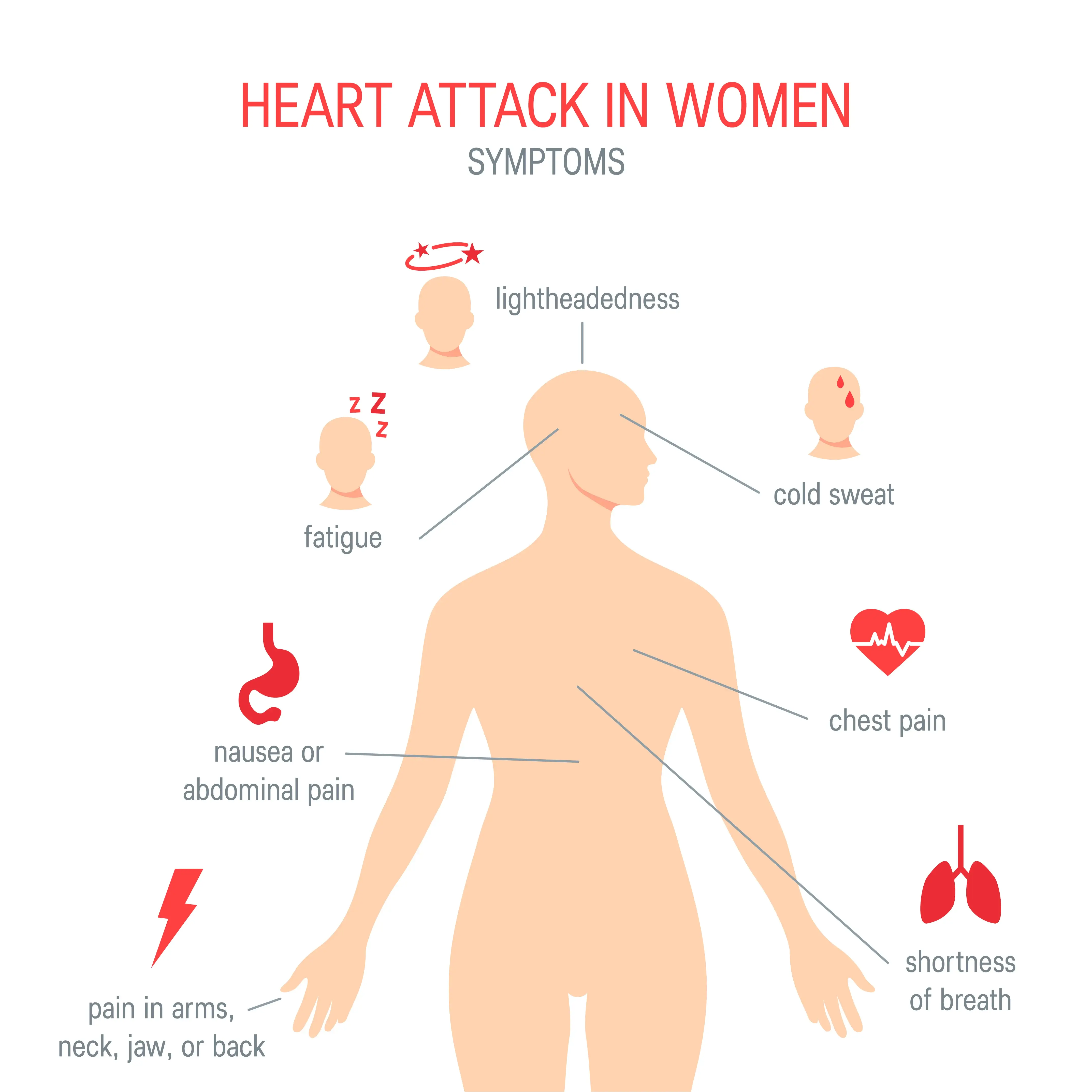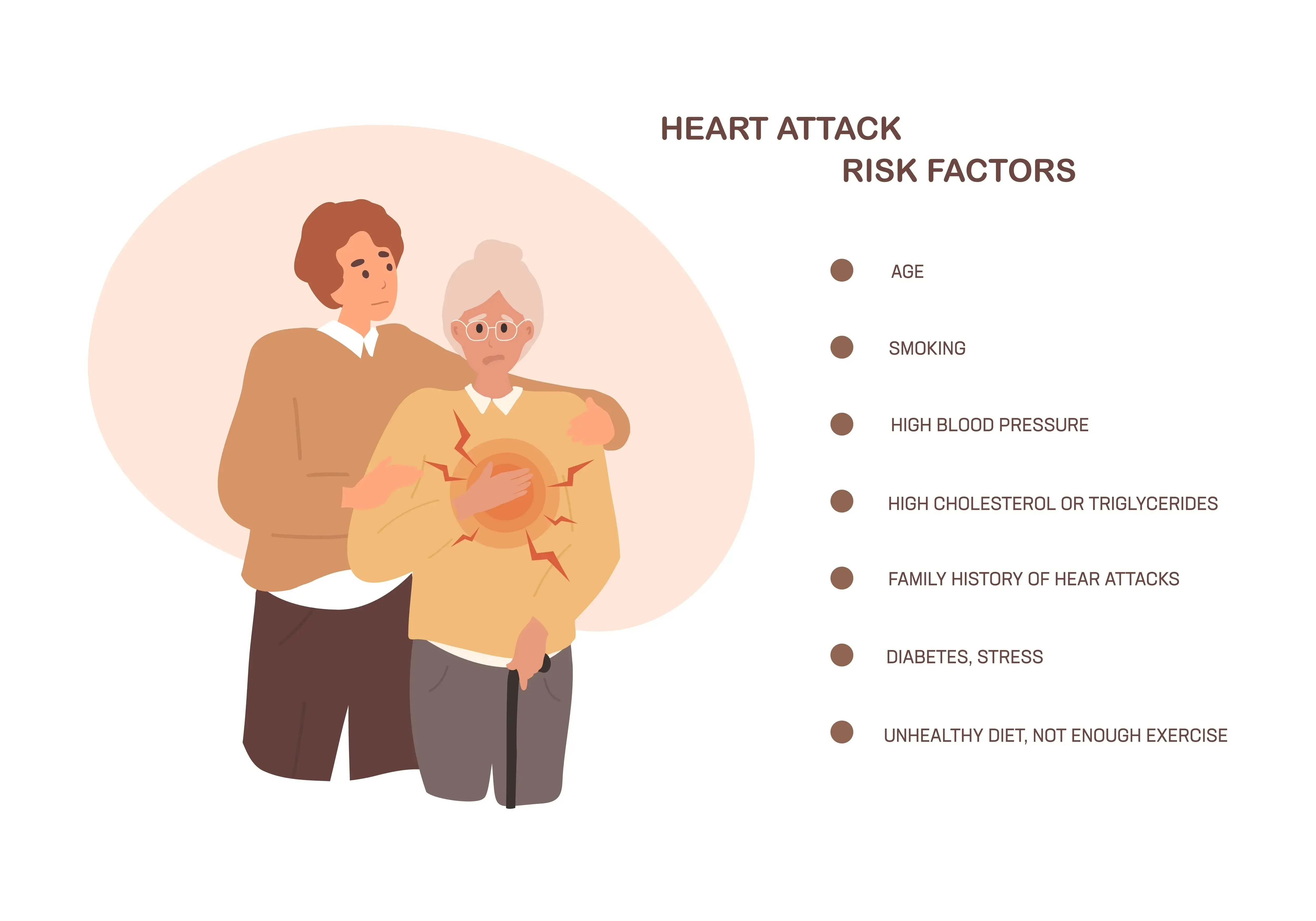Symptoms of Heart Attack In Women

In the realm of cardiology, the heart's language can be intricate and often cryptic. Within this discourse on the "Symptoms of Heart Attack In Women," we embark on an expedition to decipher the complexities of heart attacks, particularly how they uniquely manifest in women. We begin by comprehending why recognising these symptoms holds paramount importance and explore the nuanced gender disparities in heart attack symptoms.
Explore more below, or you may book an appointment for your cardiac evaluation now with our cardiologists. contact us for additional details.
Understanding Heart Attacks
Did you know heart attacks can happen to anyone, no matter how old you are? They're a serious medical emergency. To stay safe, it's important to know what causes heart attacks, what the symptoms are, and what things might increase the chances of having one. This knowledge can help prevent heart attacks or catch them early if they happen.
A Brief Overview of Heart Attacks
The heartbeat of our narrative resonates with the urgency of time. Quickly spotting symptoms is the key to keeping a balance between life and death. Finding issues early doesn't just mean getting help fast – it's also a big deal in stopping problems in the heart before they get worse.
The Critical Importance of Early Detection
Time is of the essence when it comes to a heart attack. Early detection can make the difference between life and death. Identifying symptoms promptly is key to ensuring timely medical intervention and minimising heart damage.
Common Heart Attack Symptoms in Women
Heart disease, including coronary heart disease in women, remains a leading cause of mortality among women across the globe. Women often experience atypical heart attack indicators, which can potentially be dismissed or misunderstood. Let's uncover common heart attack symptoms in women that must not be taken lightly to promote timely response and proper medical intervention.

Chest Pain or Discomfort
The chest, the heart's sanctuary, is often the first to experience the onslaught of an impending heart attack. But for women, it might not feel like the classic chest pain you hear about. Yet, women may experience it in atypical forms, such as pressure, tightness, burning, or fullness in the area surrounding the heart muscles. The subtlety of this discomfort can be deceptive.
Shortness of Breath:
A struggle to breathe, regardless of physical exertion, can be an early indicator of cardiac distress, often accompanied by chest discomfort, and is a symptom not to be taken lightly.
Overwhelming Fatigue:
Sudden, unexplained fatigue can descend like a dense fog. Ordinary tiredness pales in comparison to this unrelenting exhaustion that refuses to relent, even after adequate rest.
Nausea or Vomiting:
TThe queasiness may not arise from a gastronomic misadventure. It can manifest as nausea, vomiting, or indigestion, concealing the heart's cry for help behind a veil of gastrointestinal discomfort.
Pain in the Neck, Jaw, Back, or Shoulder:
Heart attack symptoms may extend beyond the chest, presenting as pain in the neck, jaw, back, or shoulder. These deviations should not be brushed aside as mundane aches.
Sudden and Unexplained Cold Sweats:
Sudden cold sweats may accompany an impending heart attack, often paired with an overarching sense of dread or anxiety.
Lightheadedness or Dizziness:
Lightheadedness can strike abruptly, like a precarious tightrope walk on the brink of a heart attack.
Lesser-Known Heart Attack Symptoms in Women
Heart attacks in women may present with less obvious symptoms compared to men. Women might experience daunting symptoms such as unexplained fatigue, sleep disturbances, indigestion, and anxiety. Shortness of breath, light-headedness, or unusual upper body discomfort can also signify a possible heart attack. These under-recognised symptoms could result in delayed medical attention and treatment.
Silent Heart Attacks: The Quiet Threat
Beyond the clear signs, there are hidden things that, if missed, could be bad. "Silent" heart attacks, pressure in the upper belly, feeling tired in a strange way, and symptoms like a mild flu — each shows a part of the hidden danger women might have.
Upper Abdominal Pressure: A Subtle Sign
Upper abdominal pressure may mimic digestive discomfort, but it can be the harbinger of a cardiac event. In simpler terms, feeling some pressure in your upper belly that seems like tummy troubles could be a sign that something's up with your heart. It's crucial to notice this subtle sign early on so that you can get help in time.
Unusual Fatigue: When Tiredness Feels Different
The exhaustion that accompanies heart attacks is far from ordinary. It's unexplained, disproportionate, and, crucially, not to be ignored. It's a signal that necessitates a keen understanding of its potential cardiovascular implications.
Flu-Like Symptoms: Unusual Warning Signs
Symptoms resembling a mild flu are often dismissed as common ailments. However, these can be the heart's subtle plea for help, camouflaged in the guise of a seemingly innocuous illness.
Why Women's Heart Attack Symptoms Differ
Understanding how certain risks affect women differently highlights the importance of creating awareness campaigns and medical approaches specifically designed for them.
Hormonal Influence
Hormonal fluctuations throughout a woman's life can impact heart health, making it essential to understand these dynamics. Changes in hormones, especially during life stages such as pregnancy and menopause, can impact cardiovascular health.
Smaller Coronary Arteries
Smaller coronary arteries in women can increase the risk of heart attacks and influence symptom presentation.
Compared to men, the diameter of the left main artery is about 0.44 millimetres smaller, the diameter of the left anterior descending artery is around 0.30 millimetres smaller in women, the diameter of the circumflex artery is roughly 0.43 millimetres smaller, and the diameter of the right coronary artery is approximately 0.44 millimetres smaller.
Autoimmune Diseases
Conditions like lupus or rheumatoid arthritis, more prevalent in women, can increase the risk of heart issues.
Polycystic Ovary Syndrome (PCOS)
Women with PCOS may face higher risks due to hormonal imbalances and associated conditions like diabetes.
Mental Health Factors
The intersection of mental health conditions, like depression and anxiety, can influence heart health differently in women.
Atypical Heart Attack Symptoms in Different Age Groups
Acknowledging that symptoms may vary across age groups is paramount. It emphasises the need for age-specific awareness and tailored medical responses.
Young Women
Even in the vibrant bloom of youth, women are not immune to the possibility of heart attacks. It's pivotal to recognise that symptoms of a heart attack in younger women might deviate from those commonly associated with older age groups. Beyond the classic signs of heart attack, subtle indicators may include:
- Jaw and Throat Discomfort: Younger women might experience discomfort in the jaw or throat instead of traditional chest pain.
- Extreme Fatigue: Overwhelming fatigue, often disproportionate to exertion, could be a subtle yet critical warning sign.
- Radiating Upper Back Pain: Unlike older age groups, young women might feel heart attack-related pain radiating to the upper back.
Understanding these nuances is paramount for cardiology doctors and young women themselves to ensure timely intervention and prevention strategies.
Middle-Aged Women
Middle age brings its own set of challenges, and understanding the distinct symptoms is vital for accurate diagnostics and timely medical care.
- Symptoms Mimicking Menopause: Perimenopausal symptoms can overlap with heart attack signs, leading to potential misinterpretation.
- Digestive Distress: Some middle-aged women might experience symptoms like indigestion, nausea, or vomiting during a heart attack.
- Unexplained Anxiety: Feelings of anxiety or unease might precede or accompany a heart attack in middle-aged women.
Tailored awareness campaigns and healthcare approaches should address these specific challenges faced by women in their middle years.
Older Women
As women age, their cardiovascular landscape changes, necessitating a nuanced understanding of evolving symptoms.
- Shortness of Breath During Daily Activities: Older women may experience shortness of breath during routine activities, a significant departure from their normal baseline.
- Increased Fatigue Post-Exertion: Fatigue might set in more rapidly after physical exertion, signalling potential cardiovascular strain.
- Confusion or Memory Issues: Cognitive symptoms, such as confusion or memory lapses, could accompany a heart attack in older women.
Comprehensive awareness campaigns should address the evolving nature of symptoms, encouraging older women to seek prompt medical attention.
Risk Factors for Heart Attacks in Women
Identifying and managing risk factors play a pivotal role in the prevention of heart attacks in women.

Diabetes
Diabetes, often a silent threat, amplifies the risk of heart attacks in women. Understanding its subtle influence is crucial in early intervention.
High Blood Pressure
Uncontrolled hypertension is a subtle yet potent contributor to heart attack risk in women.
High Cholesterol
Cholesterol levels play a significant role in heart health, and women need to manage them diligently.
Smoking and Secondhand Smoke Exposure
Tobacco use, including exposure to secondhand smoke, significantly heightens the risk of heart attacks in women. Addressing these modifiable risk factors becomes paramount in preventive efforts.
Obesity
Excess weight and obesity can strain the heart, necessitating proactive measures for prevention.
Family History
A family history of heart disease casts a long shadow, underscoring the importance of genetic predisposition. Genetic screening and awareness can be pivotal in preventive strategies.
Preventing Heart Attacks in Women
The Role of Healthy Lifestyle Choices
A heart-healthy lifestyle forms the foundation of prevention, emphasising dietary choices and physical activity.
Incorporating Regular Exercise
Exercise not only strengthens the heart and reduces the risk of heart failure but also contributes to overall well-being.
Maintaining a Balanced Diet
A balanced diet can mitigate the risks of heart attacks and foster overall well-being.
Stress Management
Stress is a silent foe to heart health, necessitating effective management strategies.
Importance of Regular Checkups and Screenings
Regular medical checkups and screenings are pivotal in early detection and prevention.
When to Seek Immediate Medical Help
In the extensive practice of the cardiologist, encounters with cases where dismissal of symptoms led to dire consequences have been observed. This section stands as a stark reminder never to ignore the signs, emphasising the watchword—vigilance.
Do's and Don'ts While Waiting for Help
In the role of a cardiologist, crucial guidance on actions during those critical minutes before help arrives is imparted. This functions as a pragmatic toolkit, providing valuable insights into navigating the delicate balance between doing and avoiding in moments of crisis.
Misconceptions and Myths
In the vast landscape of heart health, dispelling misconceptions is as crucial as understanding the intricacies of the cardiovascular system. Let's dismantle common myths surrounding heart attacks in women and shed light on the nuanced reality that demands our attention.
Debunking the Myth: Heart Attacks Are Only for Men
Forget what you might have heard - heart attacks aren't just a guy thing. Let's break it down: women can get them too, and it's time we all knew that. Knowing the signs and what makes women more at risk is super important.
It helps doctors spot issues early and do something about them before things get serious.
So, ladies, don't brush off those signs - understanding what's going on with your heart can make a real difference in staying healthy and getting the right help when you need it.
The Reality: You're Never Too Young for a Heart Attack
Youthfulness doesn't render women immune to the risk of a heart attack. In fact, symptoms can manifest early in life, underscoring the importance of early awareness and proactive heart health measures. We explore the reality that challenges the notion of age as a protective shield against cardiac distress in women.
Dismissing the Myth: No Chest Pain, No Heart Attack
One of the most prevalent misconceptions is the belief that heart trouble solely manifests as chest pain. As we delve into the comprehensive spectrum of symptoms, we discredit this myth and highlight alternative indicators that demand attention. Recognising the diverse signs of a heart attack that can present itself is crucial for prompt identification and intervention.
Conclusion
In conclusion, awareness and education are vital for women's heart health. Empowering women with knowledge to recognise and respond to heart attack symptoms is key. Our dedicated cardiologist at The Harley Street Heart and Vascular Centre prioritises your heart's health. Book an appointment or teleconsultation today to put your heart's well-being first.

